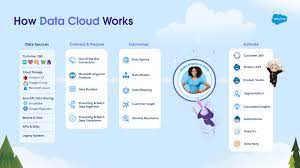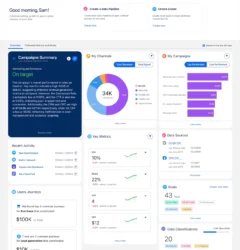Salesforce Data Cloud organizes and unifies data across Salesforce and other external data sources. After ingestion, it can drive personalization and engagement. Components of Salesforce Data Cloud to explore.
Data Cloud expands Salesforce capabilities by using the best pieces of the developer-friendly Salesforce Platform and adding a highly scalable infrastructure. Data Cloud is an evolution of Customer Data Platform—which was originally designed for marketers but now caters to broader use cases beyond marketing.
The magic of Data Cloud is in creating experiences that wow customers.
Key features and components of Salesforce Data Cloud include:
- Data Ingestion and Integration:
- Salesforce Data Cloud allows organizations to aggregate data from a variety of sources, both online and offline. This can include first-party data (data directly collected by the organization), second-party data (data shared directly between organizations), and third-party data (external data from various sources).
- Data Organization and Segmentation:
- The platform enables businesses to organize and segment their data based on various criteria, such as demographics, behavior, and preferences. This segmentation allows for more targeted and personalized marketing campaigns.
- Audience Activation:
- Salesforce Data Cloud allows businesses to activate their segmented audience data across various marketing channels, such as advertising platforms, email marketing, and customer relationship management (CRM) systems. This ensures consistent and coordinated messaging across multiple touchpoints.
- Personalization and Targeting:
- By leveraging the insights gained from aggregated data, organizations can create personalized and targeted marketing messages. This helps improve customer engagement and satisfaction by delivering more relevant content and offers.
- Privacy and Compliance:
- Salesforce Data Cloud prioritizes data privacy and compliance with regulations such as GDPR (General Data Protection Regulation) and other regional data protection laws. The platform provides tools for businesses to manage and respect user privacy preferences.
- B2B Data:
- In addition to consumer data, Salesforce Data Cloud also offers B2B data solutions. This is particularly useful for businesses targeting other businesses, allowing for better targeting and engagement with professional audiences.
- Connectivity and Integration:
- Salesforce Data Cloud is designed to integrate seamlessly with other Salesforce products and third-party applications. This ensures a unified ecosystem where data can flow smoothly across various platforms and tools.
- Customer Insights:
- The platform provides analytics and reporting features that enable businesses to gain insights into customer behavior, preferences, and engagement. This information can be used to refine marketing strategies and improve overall customer experiences.












